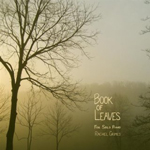|
|
 |
Dusted Reviews
Artist: Rachel Grimes Album: Book of Leaves Label: Karate Body Review date: Oct. 22, 2009 |

|
|
|
 |
The Louisville musical ensemble known as Rachel’s wedded indie-rock resumes with grander ambitions over a decade before the indie/classical overlap became the stuff of New York Times articles and curated concert series. And while they were hardly the first group to occupy this grey area, they did so memorably, releasing a series of distinctive albums, well-crafted on both a musical level and in terms of the ornate packaging in which they appeared. At times, Rachel’s seemed to be the musical complement to their math-rock contemporaries, making the case that a chamber music influence could be just as compelling as winding bass and guitar parts.
Rachel Grimes played piano in Rachel’s, and while Book of Leaves is her first solo work, her playing style here echoes her work on the group’s Selenography from a decade earlier. The format here – 14 works, many of them completed in under three minutes – is reminiscent of Max Richter’s recent 24 Postcards In Full Colour. Another recent point of reference would be Ryuichi Sakamoto’s 2007 collaboration with Christian Fennesz, Cendre. Grimes shares with Sakamoto a tendency towards an ambient style of playing, one that allows for space to hover between notes and for small resonances to emerge. This fondness for ambience reaches its apex – or, depending on your point of view, its zenith – when the sound of chirping crickets closes out “She Was Here.”
The tone of the songs on Book of Leaves ranges from sparse and muted to relentlessly propulsive. Both “My Dear Companion” and “Mossgrove” find a brisk pace from the outset, though in the case of the former that pace is contrasted with a more dramatic melody suitable for Gothic landscapes; for the latter, those notes are eventually enveloped by others, creating a drone-like quality. It’s significant to point out that the formats in which Book of Leaves is available includes not only the expected formats – CDs, LPs, and MP3s – but also as sheet music. Grimes’s intentions with this album are as much a demonstration of her abilities as a composer as they are about her work as a performer.
Those two sides of Grimes’s music don’t always mesh. “Bloodroot” is nimbly played, but the piece itself feels less defined: a Michael Nyman influence is perceptible, but Grimes’s own take on it is less clear. “Mossgrove”’s foray into drone is far more interesting, and suggests a summation of Grimes’s musical experience and interests. The later “Every Morning Birds” has the album’s most interesting (if literal) integration of field recordings, using looped birdcalls to create a percussive effect. And while Book of Leaves occasionally becomes too understated, its most interesting moments blend a precision that’s as old as the instrument Grimes plays with a willingness to incorporate more contemporary elements. The album’s artwork includes the designation “For Solo Piano,” but Book of Leaves is at its best when it subverts and modifies what is expected of that phrase.
By Tobias Carroll
|







